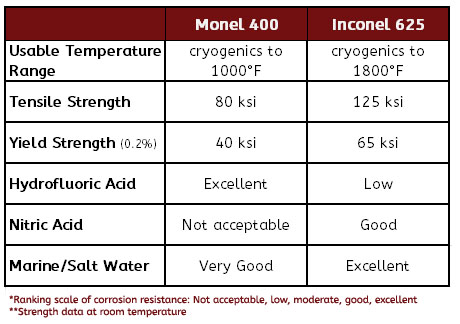Sie sind sich nicht sicher, welches Material für Ihre Anwendung am besten geeignet ist?
Kontaktieren Sie einen Experten
Tag Archives: Alloy 400
Posted on January 26, 2018 by dean
Q: I’m running a chemical cleaning process on stainless steel to remove the oxides and to enrich the chromium depleted areas again surface. It’s an acid pickling process, where mixtures of hydrofluoric acid (HF) and nitric acid (HNO3) are used. I’ve tried Hastelloy C276 bolting on my tanks because I thought … Continue reading →
Posted in Application, Corrosion Resistance, FAQs, Specialty Metal Fasteners, Technical Questions | Tagged Alloy 400, Alloy C2000, bolts for acid pickling, bolts for HF, bolts for hydrofluoric acid, bolts for nitric acid, bolts for steel pickling, fasteners for acid pickling, fasteners for HF, fasteners for hydrofluoric acid, fasteners for nitric acid, fasteners for steel pickling, hastelloy C2000, Monel | Leave a comment
Posted on November 15, 2017 by dean
Q: I have a high strength application that requires resistance to damp salt air and occasional sea splash, I’m using Monel 400 but it’s not holding up the the 75ksi of yield I need. Lots of broken bolts? Is is corrosion or strength? Thoughts? A: Your issue isn’t the corrosion. … Continue reading →
Posted in Application, Corrosion Resistance, FAQs, High Strength, Material, Specialty Metal Fasteners, Technical Questions | Tagged Alloy 400, Alloy K500, Corrosion, Duplex 2507, Duplex Steel, Monel, Monel 400, Monel K500, salt water, salt water corrosion, sea water corrosion, seawater | Leave a comment
Posted on November 14, 2017 by dean
Q: Is AL6XN a steel or nickel alloy? Trying to figure out if it would perform as well as Monel in seawater. A: To answer your first question, AL6XN bolts are actually both a nickel and a steel alloy. AL6XN is often described as a high nickel content stainless alloy. Though … Continue reading →
Posted in Application, Corrosion Resistance, FAQs, Material, Specialty Metal Fasteners, Technical Questions | Tagged AL-6XN, AL6XN, Alloy 400, Corrosion, Crevice Corrosion, Monel, Monel 400, pitting, pitting corrosion, salt water, salt water corrosion, sea water corrosion, seawater, stagnant salt water, stagnant water | Leave a comment
Posted on November 2, 2017 by dean
 Nickel alloys are a special class of metals containing high levels of nickel (often greater than 20%). They play a key role in industry for their unique combination of high strength, corrosion resistance to harsh acids (like hydrochloric and sulfuric) and high temperature stability. This two-part newsletter will help summarize the distinct benefits of the … Continue reading →
Nickel alloys are a special class of metals containing high levels of nickel (often greater than 20%). They play a key role in industry for their unique combination of high strength, corrosion resistance to harsh acids (like hydrochloric and sulfuric) and high temperature stability. This two-part newsletter will help summarize the distinct benefits of the … Continue reading →
Posted in Application, Blog, Corrosion Resistance, Material, Specialty Metal Fasteners | Tagged AL-6XN, AL6XN, Alloy 20, Alloy 400, Alloy K500, Carpenter 20, Corrosion, corrosion resistance, Monel, Monel 400, Monel K500, nickel, nickel alloys, Salt Water Resistance, Sea Water Resistance, Specialty Metals, Sulfuric Acid | Leave a comment
Posted on May 22, 2017 by dean
Q: I’m using hydrogen fluoride used in a manufacturing process to make refrigerants. I know it’s very corrosive and have tried both hastelloy and inconel fasteners, which I thought were super corrosion resistant. What am I doing wrong because the acid is still eating them? Should I try Tantalum? A: … Continue reading →
Posted on May 11, 2017 by dean
 They rhyme, are both used in extreme environments, and are both nickel metal alloys, but Monel and Inconel are actually very different. But how? Let’s start with basic chemistry. Monel is a nickel-copper alloy and Inconel is a nickel-chromium alloy. So what does that mean for your extreme application? We … Continue reading →
They rhyme, are both used in extreme environments, and are both nickel metal alloys, but Monel and Inconel are actually very different. But how? Let’s start with basic chemistry. Monel is a nickel-copper alloy and Inconel is a nickel-chromium alloy. So what does that mean for your extreme application? We … Continue reading →
Posted in Application, Blog, Corrosion Resistance, High Strength, High Temperature Resistance, Specialty Metal Fasteners | Tagged Alloy 400, Alloy 625, Corrosion, hastelloy C2000, High Temperature, Hydrofluoric acid, Inconel, Inconel 625, Monel, Monel 400, saltwater corrosion, sea water corrosion | 1 Comment
